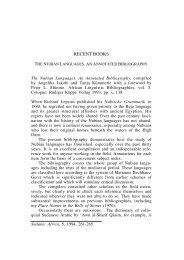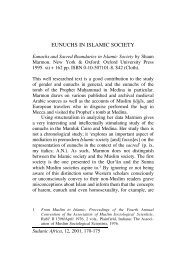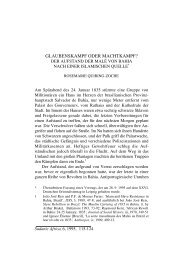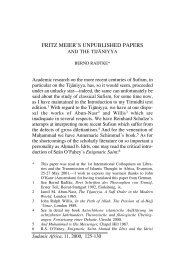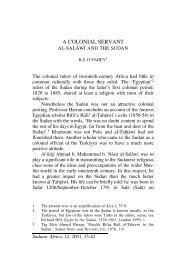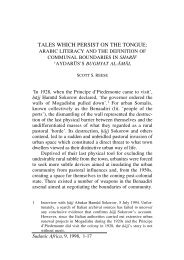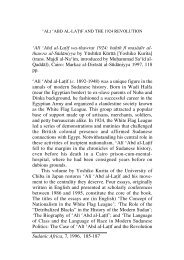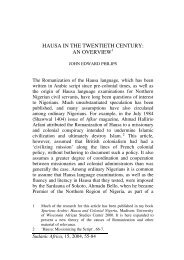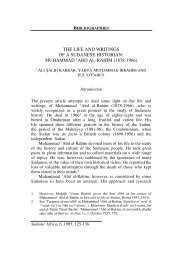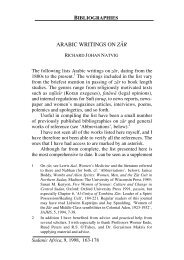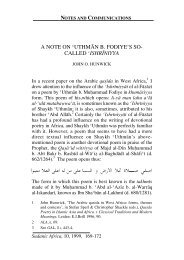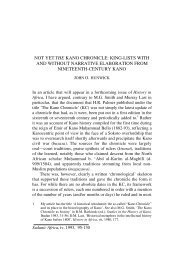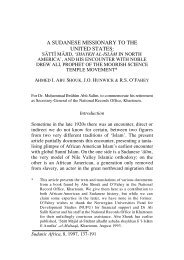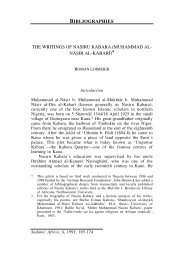Muslim Women's Quest for Equality: Between Islamic Law and ...
Muslim Women's Quest for Equality: Between Islamic Law and ...
Muslim Women's Quest for Equality: Between Islamic Law and ...
Create successful ePaper yourself
Turn your PDF publications into a flip-book with our unique Google optimized e-Paper software.
Critical Inquiry / Summer 2006 631<strong>Muslim</strong> world. 1 As in Afghanistan, it seems that most Iraqi <strong>Muslim</strong>s see theneoimperialist intervention as a direct assault on their religion, which hasgiven a new legitimacy to radical Islamist groups <strong>and</strong> undermined the position<strong>and</strong> discourse of progressive <strong>for</strong>ces.It is debatable (<strong>and</strong> has been much debated) how far, in either Afghanistanor Iraq, the two interventions have resulted in improvements in humanrights in general <strong>and</strong> women’s rights in particular. 2 In short, theexperiences of women in Iran, where a movement <strong>for</strong> democratic re<strong>for</strong>memerged after two decades of sharia as the source of law, have become directlyrelevant to women’s quest <strong>for</strong> equality in the two neighboring countries.There are two main elements to the argument that follows. First, oneparadoxical <strong>and</strong> unintended consequence of the Islamists’ reintroductionof sharia in Iran <strong>and</strong> their attempt to en<strong>for</strong>ce its premodern m<strong>and</strong>ates hasbeen to open a new dialogue between <strong>Islamic</strong> law <strong>and</strong> feminism. This dialogue,in turn, has become a catalyst <strong>for</strong> the emergence of new re<strong>for</strong>mist<strong>and</strong> feminist voices in Islam that are changing the terms of reference of<strong>Islamic</strong> discourses from within. Secondly, without the democratization<strong>and</strong>modernization of Islam’s legal vision, <strong>Muslim</strong> women’s quest <strong>for</strong> equalrights will be held hostage to the <strong>for</strong>tunes of various political tendencies,both internal <strong>and</strong> external.But first a note on my position <strong>and</strong> conceptual framework is in order. Aclear statement of position is needed, as not only the media <strong>and</strong> populardiscourse but also the bulk of academic discussions on Islam <strong>and</strong> womenare replete with rhetoric in the guise of either facts or scholarship. A monolithicview of Islam still dominates both popular <strong>and</strong> academic discourses. 3Too often we hear statements beginning “Islam is,” “the Koran says,” or1. Although the leading religious authority in Iraq, Ayatollah Sistani, differs from the rulingIranian clerics on the proper role of religion in government, his interpretations of the sharia ongender relations <strong>and</strong> family law are more conservative, traditional, <strong>and</strong> patriarchal. His views areavailable on his website (www.sistani.org), which contains his rulings <strong>and</strong> fatwas on family <strong>and</strong>gender relations. For reports on recent developments, see <strong>for</strong> instance Isobel Coleman <strong>and</strong>Mehlaqa Samdani, “Promote Iraqi Women’s Rights within an <strong>Islamic</strong> Framework,” ChristianScience Monitor, 14 Oct. 2005, p. 9; Edmund S<strong>and</strong>ers, “The Conflict in Iraq: <strong>Islamic</strong> Slant inthe Charter Is Decried,” Los Angeles Times, 8 Aug. 2005, p. A1; <strong>and</strong> Coleman, “Women, Islam,<strong>and</strong> the New Iraq,” Foreign Affairs 85 (Jan.–Feb. 2006), http://www.<strong>for</strong>eignaffairs.org/20060101faessay85104/isobel-coleman/women-islam-<strong>and</strong>-the-new-iraq.html2. For a discussion, see Lila Abu-Lughod, “Do <strong>Muslim</strong> Women Really Need Saving?Anthropological Reflections on Cultural Relativism <strong>and</strong> Its Others,” American Anthropologist 194(Sept. 2002): 783–90, <strong>and</strong> Roksana Bahramitsh, “The War on Terror, Feminist Orientalism, <strong>and</strong>Orientalist Feminism: Case Studies of Two North American Bestsellers,” Critique 14 (2005):221–35.3. See Mir-Hosseini, Islam <strong>and</strong> Gender: The Religious Debate in Contemporary Iran (Princeton,N.J., 1999), pp. 3–6.



